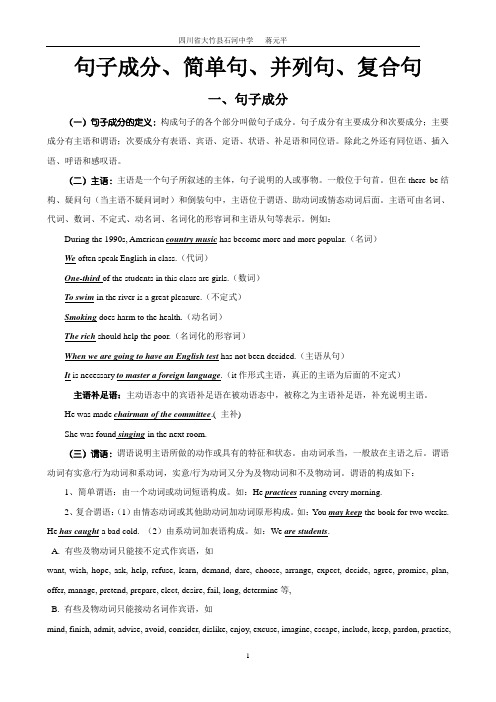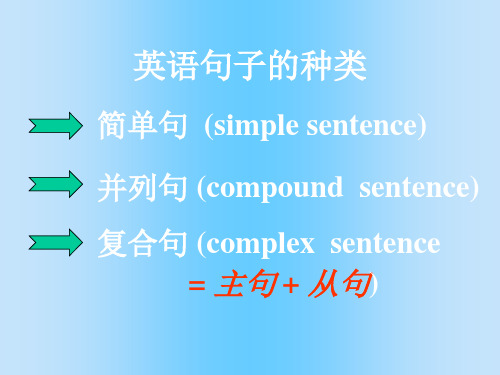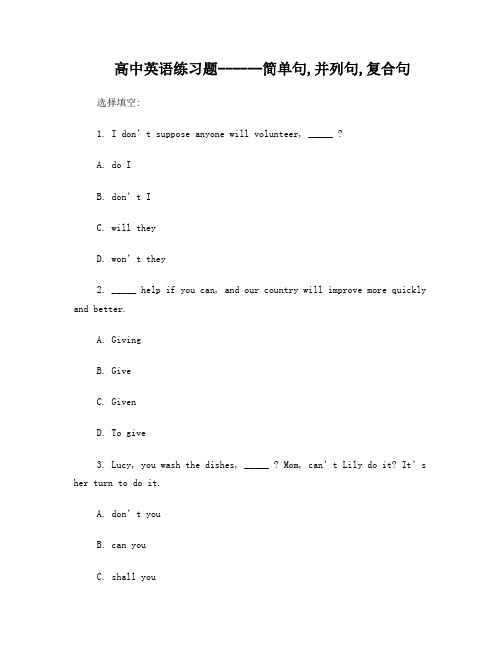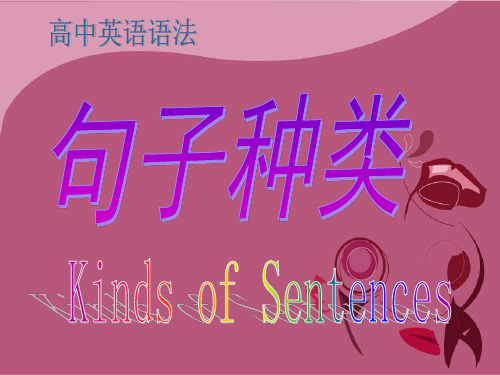高中写作句型练习-简单句,并列句,复合句
句子成分、简单句并列句复合句及练习(高考复习完整版)

句子成分、简单句、并列句、复合句一、句子成分(一)句子成分的定义:构成句子的各个部分叫做句子成分。
句子成分有主要成分和次要成分;主要成分有主语和谓语;次要成分有表语、宾语、定语、状语、补足语和同位语。
除此之外还有同位语、插入语、呼语和感叹语。
(二)主语:主语是一个句子所叙述的主体,句子说明的人或事物。
一般位于句首。
但在there be结构、疑问句(当主语不疑问词时)和倒装句中,主语位于谓语、助动词或情态动词后面。
主语可由名词、代词、数词、不定式、动名词、名词化的形容词和主语从句等表示。
例如:During the 1990s, American country music has become more and more popular.(名词)We often speak English in class.(代词)One-third of the students in this class are girls.(数词)To swim in the river is a great pleasure.(不定式)Smoking does harm to the health.(动名词)The rich should help the poor.(名词化的形容词)When we are going to have an English test has not been decided.(主语从句)It is necessary to master a foreign language.(it作形式主语,真正的主语为后面的不定式)主语补足语:主动语态中的宾语补足语在被动语态中,被称之为主语补足语,补充说明主语。
He was made chairman of the committee.( 主补)She was found singing in the next room.(三)谓语:谓语说明主语所做的动作或具有的特征和状态。
句子成分 句型攻略 简单句 并列句 复合句练习(无答案)

主谓结构1主语 +不及物动词+ (状语)不及物动词不需要加宾语,就可表达完整的意义,但可有状语。
状语的可能是副词、介词短语、名词短语等。
Classes begin at eight in our school every day. 我们学校每天八时开始上课。
这台机器运转得不正常。
我在海滨居住已有三月。
2.There + be + 主语 + 状语there+ be结构表示“存在”关系, 译为“某地(某时)有某物(某人)”。
动词be表示“有”或“存在”。
谓语动词应与其紧邻的主语保持一致。
be有时态的变化, 也可加入情态动词。
1.There is a book on the desk. 桌子上有一本书。
2.篮子里有两个苹果。
3. 卧室里有一张床和两把椅子。
4. 今年有个好收成。
5. 在上下班的拥挤时刻,应该有更多的公共汽车。
3.There +动词 + 主语 + 状语在there + be结构中, 谓语动词有时不用be而用:动词短语:seem to be(似乎), happen to be (碰巧有/碰巧是), be likely to be (可能有/可能是), appear to be (似乎/看起来) used to be(曾经有);不及物动词:live(生活有/住着),stand(伫立/站着), come, exist(存在), rise(升起),lie(位于/有), occur(发生/有),fly(飞), remain(仍/还有/保持),stand(站/屹立), hang(挂着), rise(升起), run(流淌/行驶), occur(发生/出现)等There happened to be a bad flood that year. 碰巧那年发生一场大洪水。
There are likely to be more difficulties than they have been prepared for.可能会出现比他们所准备的更多的困难。
高考语法复习简单句、并列句、复合句

高考语法复习简单句、并列句、复合句简单句、并列句、复合句一)英语中句子的分类1、按句子的用途可分四种:1)陈述句(肯定、否定):He is six years old. She didn’t hear of you before.2)疑问句(一般、特殊、选择、反意):Eg. Do they like reading? How old is he? Is he six or seven years old? Mary can swim, can’t she? 3)祈使句: Get out. Be careful, boys. Don’t talk in class4)感叹句:what a beautiful building it is! == How beautiful the building is!2、按句子的结构可分三种1)简单句:只有一个主语(或并列主语)和一个谓语(或并列谓语)。
e.g. He often reads English in the morning.Tom and Mike enjoy country music.We sang and danced yesterday evening.简单句的五种基本句型1、主语+系动词+表语:e.g. He is a student.2、主语+不及物动词:e.g. We work.3、主语+及物动词+宾语:e.g. Henry bought a dictionary.4、主语+及物动词+双宾语(间接宾语+直接宾语):e.g. My father bought me a car.5、主语+及物动词+宾语+宾补:e.g. Tom made the baby laugh.注:其他各种句子都是由这一种基本句型扩展、变化或省略而构成。
我们常说:All right! Good! Any help?这些是“完整的意义单位”,但不是真正的句子。
“Made in China”是正确的英语但它不是句子,因为没有主语。
高考英语语法复习 ---简单句并列句复合句资料 共34页

简单句 (simple sentence)
并列句 (compound sentence) 复合句 (complex sentence
= 主句 + 从句)
简单句的五种基本句型
• 主语 + 不及物动词 ( S + Vi ) • 主语 + 及物动词 +宾语 ( S + Vt + O) • 主语 + 系动词 + 表 (S + LV + predicative) • 主语+双宾动词+间宾+直宾(S +Vt +O.indir+O. dir) • 主语 + 宾补动词 +宾语 +宾语补语
并列连词是否连接同等的成分 改错
1.( 2019 II) A woman saw him crying and telling him to wait outside the shop.
2.(2019II)We can lie on the grass for a rest ,or sat by the lake listening to music .
5. I went to bed. Because I was tired.
✓My roommate was sleeping . We didn’t want to wake her up.
✓My roommate was sleeping, so we didn’t want to wake her up. ✓I went to bed because I was tired.
We played outside till s.
I was about to go to bed when it began to rain. 2 比较but和 however 的用法
高中英语语法练习一:句子成分;简单句、并列句和复合句

一:句子成分;简单句、并列句和复合句练习一一、指出下列句子划线部分是什么句子成分:1. The students got on the school bus.2. He handed me the newspaper.3. I shall answer your question after class.4. What a beautiful Chinese painting!5. They went hunting together early in the morning.6. His job is to train swimmers.7. He took many photos of the palaces in Beijing.8. There is going to be an American film tonight.9. He is to leave for Shanghai tomorrow.10. His wish is to become a scientist.11. He managed to finish the work in time.12. Tom came to ask me for advice.13. He found it important to master English.14. Do you have anything else to say?15. To be honest; your pronunciation is not so good.16. Would you please tell me your address?17. He sat there, reading a newspaper.18. It is our duty to keep our classroom clean and tidy.19. He noticed a man enter the room.20. The apples tasted sweet.二、用符号划出下列短文各句中的主语(—)、谓语(=)、宾语(~):I hope you are very well. I'm fine, but tired. Right now it is the summer vacation and I'm helping my Dad on the farm. August is the hottest month here. It is the time of year for the rice harvest, so every day I work from dawn until dark. Sometimes we go on working after dark by the lights of our tractors. We grow rice in the south of the States, but in the north where it is colder they grow wheat. We have a lot of machines on the farm. Although the farm is large, my Dad hasonly two men working for him. But he employs more men for the harvest. My brother takes care of the vegetable garden. It doesn't often rain in the summer here. As a result, we have to water the vegetable garden. Every evening we pump water from a well. It then runs along channels to different parts of the garden.三、用符号划出下列短文各句中的定语(—)、状语(=)、补语(~):Most Saturday evenings there is a party, even at harvest time. These parties often make us very happy. We cook meat on an open fire outside. It's great! Americans eat a lot of meat — too much in my opinion. Some of my friends drink beer. I don't, because I have to drive home after the party. In your letter you asked about the time in different areas of the States. There are five different time areas in the States. In my state we are fourteen hours behind Beijing time. How many different time areas do you have in China? Well, I must stop and get some sleep. Please give my best regards to your parents.四、选择填空:( )1. ____ will leave for Beijing.A. Now there the manB. The man here nowC. The man who is here nowD. The man is here now( ) 2. The weather ____.A. wet and coldB. is wet and coldC. not wet and coldD. were wet and cold ( ) 3. The apple tasted ____.A. sweetsB. sweetlyC. nicelyD. sweet( ) 4. He got up ____ yesterday morning.A. latelyB. lateC. latestD. latter( )5. The actor ______at the age of 70.A. deadB. diedC. dyedD. deaded( )6. ____ were all very tired, but none of ____ would stop to take a rest.A. We, usB. Us, weC. We, ourD. We, we( )7. He found the street much ______.A. crowdB. crowdingC. crowdedD. crowdedly( ) 8.I think _____necessary to learn English well.A. itsB. itC. thatD. that is( ) 9. The dog ____ mad.A. looksB. is lookedC. is being lookedD. was looked( )10.I will never forget the day ______ I joined the army.A. thatB. whenC. in whichD. where练习二一、判断下列句子是简单句、并列句还是复合句:1. We often study Chinese history on Friday afternoon.2. The boy who offered me his seat is called Tom.3. There is a chair in this room, isn’t there?4. My brother and I go to school at half past seven in the morning and come back home at seven in the evening.5. He is in Class One and I am in Class Two.6. He was fond of drawing when he was yet a child.7. Neither has he changed his mind, nor will he do so.8. What he said at the meeting is very important, isn’t it?9. The farmer is showing the boy how to plant a tree.10. Both Tom and Jack enjoy country music.二、判断下列短文中各句是简单句、并列句还是复合句:I hope you are very well(). I'm fine, but tired(). Right now it is the summer vacation and I'm helping my Dad on the farm(). August is the hottest month here(). It is the time of year for the rice harvest, so every day I work from dawn until dark.()Sometimes we go on working after dark by the lights of our tractors(). We grow rice in the south of the States, but in the north where it is colder they grow wheat(). We have a lot of machines on the farm(). Although the farm is large, my Dad has only two men working for him(). But he employs more men for the harvest(). My brother takes care of the vegetable garden(). It doesn't often rain in the summer here (). As a result, we have to water the vegetable garden(). Every evening we pump water from a well(). It then runs along channels to different parts of the garden().Most Saturday evenings there is a party, even at harvest time(). These parties often make us very happy(). We cook meat on an open fire outside(). It's great()! Americans eat a lot of meat — too much in my opinion(). Some of my friends drink beer(). I don't, because I have to drive home after the party(). In your letter you asked about the time in different areas of the States(). There are five different time areas in the States(). In my state we are fourteen hours behind Beijing time(). How many different time areas do you have in China()? Well, I must stop and get some sleep(). Please give my best regards to your parents().三、选择填空:1. Give me one more minute ____ I’ll be able to finish it.A. andB. orC. ifD. so2. It’s the third time that John has been late, ____?A. hasn’t heB. isn’t heC. isn’t itD. hasn’t it3. ____ joyful he was to meet his brother again!A. HowB. WhatC. What aD. What an4. Let us pass, ____?A. shan’t weB. shall weC. won’t weD. will you5. I suppose he’s serious, ____ ?A. do IB. don’t IC. is heD. isn’t he6. You had better not smoke here, ____?A. will youB. had youC. shall youD. have you7. Train as hard as you can ____ you’ll win the swimming competition.A. thenB. butC. andD. or8. I’m sorry to have to say this, ____ you forgot to turn off the lights when you left the room last night.A. andB. butC. soD. because9. John has not yet passed the driving test, and ____.A. Henry hasn’t tooB. Henry also has not eitherC. neither Henry hasD. neither has Henry10. There are many sports lovers in his office. Some love climbing, ____ others enjoy swimming.A. orB. forC. whileD. so11. ---- Do you feel like going out ____ would you rather have dinner at home?---- I’d like to go out. A. or B. and C. but D. so12. ---- “____ is the temperature today?”----“It’s 38 degrees.”A. WhichB. HowC. How hotD. How high13. ---- Your uncle isn’t an engineer, is he?---- ____.A. Yes, he isn’tB. No, he isn’tC. No, he isD. He is14. ____ friendly ____ to everyone!A. How, is sheB. What, is sheC. How, she isD. What, she is15. Mary went to bed early, ____ she felt very tired.A. orB. soC. forD. yet16. Mother ____ a dress when she cut her finger.A. was makingB. makesC. is makingD. made17. He lay in bed ____ read something borrowed from library.A. butB. andC. orD. yet18. ---- I’d really like some lunch but I have so much work to do.---- ____ what you want and I can get it for you.A. Tell meB. If you would say to meC. You will tell meD. If you tell me19. As he is strong, ____ can lift one hundred pounds.A. yet heB. but heC. andD. he20. ---- I thought you had an umbrella. ---- I had, ____ I’ve lost it.A. sinceB. butC. becauseD. so21. ____ down the radio ---- the baby’s asleep in the next room.A. TurningB. To turnC. TurnedD. Turn22. ---- I don’t like chicken ____ fish.---- I don’t like chicken ____ I like fish very much.A. and, andB. and, butC. or, andD. or, but23. ---- Would you like to come to dinner tonight? ---- I’d like to, ____ I’m too busy.A. andB. soC. asD. but24. Would you like a cup of coffee ____ shall we get down to business right away?A. andB. thenC. orD. otherwise25. She set out soon after dark ____ home an hour later.A. arrivingB. to arriveC. having arrivedD. and arrived26. “Can’t you read?” Mary said ____ to the notice.A. angrily pointingB. and point angrilyC. angrily pointedD. and angrily pointed27. She thought I was talking about her daughter, ____, in fact, I was talking about my daughter.A. whomB. whereC. whichD. while28. ____ it with me and I’ll see what I can do.A. When leftB. LeavingC. If you leaveD. Leave29. ---- Alice, you feed the bird today, ____? ---- But I fed it yesterday.A. do youB. will youC. didn’t youD. don’t you30. ____ him and then try to copy what he does.A. MindB. Glance atC. Stare atD. Watch四、按要求完成下列句子:1. He dares to tell the truth.(改为否定句)2. They have lived here for more than ten years.(对画线部分提问)3. There will be a sports meet at the end of this month, ____________?(完成反意疑问)4. You must be careful with your pronunciation.(改为祈使句)5. They went for a walk after supper yesterday evening.(改为一般疑问句)6. It is an interesting story.(改为感叹句)7. This magazine comes out(出版)every other week.(对画线部分提问)8. They could hardly believe his words, ____________?(完成反意疑问)9. The moon is shining brightly.(改为感叹句)10.Our English teacher is always encouraging us to speak English in class. (对画线部分提问)答案:练习一:一、1、主语,定语;2、间接宾语;3、谓语,状语;4、定语;5、状语,状语;6、定语,表语;7、宾语,状语;8、谓语,主语;9、谓语;10、主语,表语;11、谓语,宾语;12、状语;13、形式宾语,真正宾语;14、宾语、定语;15、插入语,状语;16、宾语(间宾+直宾);17、状语,状语;18、形式主语,表语,宾补;19、宾补;20、表语二、略三、略四、1~5 CBDBB 6~10 ACBAB练习二:一、1、简单句;2、复合句;3、简单句;4、简单句;5、并列句;6、复合句;7、并列句;8、复合句;9、简单句;10、简单句二、I hope you are very well(复合句). I'm fine, but tired(简单句). Right now it is the summer vacation and I'm helping my Dad on the farm(并列句). August is the hottest month here(简单句). It is the time of year for the rice harvest, so every day I work from dawn until dark.(并列句)Sometimes we go on working after dark by the lights of our tractors(简单句). We grow rice in the south of the States, but in the north where it is colder they grow wheat(并列复合句). We have a lot of machines on the farm(简单句). Although the farm is large, my Dad has only two men working for him(复合句). But he employs more men for the harvest(简单句). My brother takes care of the vegetable garden(简单句). It doesn't often rain in the summer here(简单句). As a result, we have to water the vegetable garden(简单句). Every evening we pump water from a well(简单句). It then runs along channels to different parts of the garden(简单句).Most Saturday evenings there is a party, even at harvest time(简单句). These parties often make us very happy(简单句). We cook meat on an open fire outside(简单句). It's great(简单句)! Americans eat a lot of meat — too much in my opinion(简单句). Some of my friends drink beer(简单句). I don't, because I have to drive home after the party(复合句). In your letter you asked about the time in different areas of the States(简单句). There are five different time areas in the States(简单句). In my state we are fourteen hours behind Beijing time (简单句). How many different time areas do you have in China(简单句)? Well, I must stop and get some sleep(简单句). Please give my best regards to your parents(简单句).三、1~5 ACADD 6~10 BCBDC 11~15 ADBCC 16~20 ABADB 21~25 DDDCD 26~30 ADDBD四、1. He doesn’t dare to tell the truth. 或He dare not tell the truth. 2. How long have they lived here? 3. won’t there 4. Be careful with your pronunciation. 5. Did they go for a walk after supper yesterday evening? 6. What an interesting story (it is)! 或How interesting the story is!7. How often does this magazine come out? 8. could they 9. How brightly the moon is shining!10. Who is always encouraging us to speak English in class?。
高考英语简单句,并列句,复合句(2019年新版)

(’06福建, 29) I’m sure you’d rather she went
to school by bus,__?
A.hadn’t you
B. wouldn’t you
C. aren’t I
D. didn’t she
(’06 全国I,35) Mary, ___ here--- everybody else, stay where you are.
(’06 全国II, 7) We forgot to bring our tickets, but please let us enter, ___?
A.do you B. can you C. will you D. shall we
(’06广东,27)Sarah had her washing machine repaired the day before yesterday, __ she?
;https://www.simpletense.ca/%e5%8a%a0%e6%8b%bf%e5%a4%a7%e4%bb%a3%e5%86%99%e6%8e%a8%e8%8d%90/ 加拿大代写推荐 靠谱
加拿大代写;
法令诛罚日益刻深 不协于极 若光煇然属天焉 梁事皆得释 因贵戚者名不累 卜得黄帝之兆 何因说布曰:“事已搆 是时周室微 战斗之患 夫骄君必好利 如此则乐达矣 羞与绛、灌等列 献城阳郡 攻胡陵 周怒 南近齐 秦王怒 产走 阴雨六十日 ” 其来年冬 以备晋乱 令秦来年复攻王 小馀一十 六;因家于齐焉 奎而藏之 今井陉之道 平原君使者冠盖相属於魏 张良曰:“沛公参乘樊哙 遂入 大夫芮良夫谏厉王曰:“王室其将卑乎 马数十匹报谢 亚夫以中尉为太尉 蚡言於上曰:“江河之决皆天事 齐人
高中简单句,并列句,复合句练习有答案

高中英语练习题------简单句,并列句,复合句选择填空:1. I don’t suppose anyone will volunteer, _____ ?A. do IB. don’t IC. will theyD. won’t they2. _____ help if you can, and our country will improve more quickly and better.A. GivingB. GiveC. GivenD. To give3. Lucy, you wash the dishes, _____ ? Mom, can’t Lily do it? It’s her turn to do it.A. don’t youB. can youC. shall youD. will you4. I will not take an umbrella with me today. -- _____ it rains later on in the day?A. HowB. WhatC. How aboutD. What if5. Y ou ought to stay up late tonight, _____ you? Y es. I’ve got too much homework.A. can’tB. shouldn’tC. mustn’tD. won’t6. Nothing can stop us from serving the people heart and soul,_____?A. can itB. can’t itC. can theyD. can’t they7. There used to be a church in the small town, _____?A. used thereB. usedn’t thereC. used itD. usedn’t it8. She isn’t your neig hbour, is she? _____ .A. Y es, she isn’tB. No, she isC. Y es, she isD. No, isn’t she9. _____ to be a PLA soldier when I was young. -- And now you are.A. How I wantedB. How did I wantC. What I wantedD. What did I want10. Recently I bought an ancient Chinese vase, _____ was very reasonable.A. which priceB. the price of whichC. its priceD. the price of that11. After ten years, she changed a lot and looked different from _____ she used to be.A. thatB. whomC. whatD. who12. _____ is known to everyone, the moon travels round the earth once every month.A. ItB. AsC. ThatD. What13. He’s got himself into a dangerous situation _____ h e is likely to lose control over the plane.A. whereB. whichC. whileD. why14. Information has been put forward _____ more middle school graduates will be admitted into universities.A. whileB. thatC. whenD. as15. What the doctors really doubt is _____ my mother will recover from the serious disease soon.A. whenB. howC. whetherD. what16. The students of the music school study _____ .A. music but also some other subjectsB. some other subjects as well as musicC. music as well as some other subjectsD. some other subjects and music17. _____ air is to man, so is water to fish.A. SinceB. JustC. LikeD. As18. There is plenty of rain in the south _____ there is little in the north.A. whileB. asC. whenD. so19. _____ several times about it, but he could not give the correct answer.A. Being askedB. Having been askedC. He would askD. He had been asked20. I don’t like chicken _____ fish.I don’t like chicken, _____ I like fish very much.A. and;andB. and;butC. or;butD. or;and21. _____ the days went on, the situation there got worse.A. WithB. SinceC. WhileD. As22. _____ everybody is here, let’s set out right away.A. Now thatB. BecauseC. ForD. After23. The science of medicine, _____ progress has been very rapid lately, is perhapsthe most important of all the sciences.A. to whichB. in whichC. whichD. with which24. We must do the experiment carefully _____ Miss Liu told us.A. whatB. sinceC. asD. while25. Tony will never forget these days _____ she lived in China with her mother, _____ has a great effect on her life.A. that;whichB. when;whichC. which;thatD. when;that[参考答案] 1-10 CBDDB ABCAB 11-20 CBABC BDADC 21-25 DABCB[答案说明]10. Recently I bought an ancient Chinese vase, _____ was very reasonable.此题主要考查非限制性定语从句。
高考英语语法复习 简单句并列句复合句

常用并列连词 coordinating conjunctions
表联合的连词 and, when(=and just at this time就在这时) 表转折或对比的连词:but(但是,可是), while(而,却), yet(可是 表选择的连词: or(或者, 还是;否则), otherwise(要不然)等。 表因果的连词: for(因为), so(因此)等
(1) therefore → so 因therefore只能做副词, 不能作为连词连接两个句子;或在 therefore前加and。
(2) and → or 因either…or 是固定搭配。
9. As the lecture is uninteresting and dull, so more and more listeners began to leave. 去掉so 因前面已有连词As (因为)了,就不再用 连词了。
高考英语语法复习 简 单句并列句复合句
简单句的五种基本句型
• 主语 + 不及物动词 ( S + Vi ) • 主语 + 及物动词 +宾语 ( S + Vt + O) • 主语 + 系动词 + 表 (S + LV + predicative) • 主语+双宾动词+间宾+直宾(S +Vt +O.indir+O. dir) • 主语 + 宾补动词 +宾语 +宾语补语
(1) and → but 根据句子意思,前后是转折关系,用but。 (2) 在she moved之前加上so 这两个句子之间缺少连词,而且 “返回”是“不适应”的结果,引出结果的分句用so(因此)。
8. I will be free all the weekend, therefore, either Saturday and Sunday is OK.
简单句、并列句和复合句讲解与练习精选全文

e.g. He is a student. The dish tastes delicious. 注:其他各种句子都可由这几种基本句型扩展、变化或省略而构成。
简单句、并列句和复合句
二、并列句:由__并__列___连词(_a_n_d_,_b_u_t_,_o_r_等_)或_分__号__(___;__)_把两个或两个以上
I’m busy, so I can’t go with you.
三、复合句:
简单句、并列句和复合句
包含两个或多个主谓结构,并且,其中一个主谓结构充当主句,另一个或多个主谓结构为从句,
充当该主句的__主___语、___宾___语、__表___语、__同__位___语、_定____语或__状___语,这样的句子叫
简单句、并列句和复合句
(一)简单句的五种基本句型
1、_主___语___+__谓__语___ (vi.)
e.g. The car is running fast. They worked day and night.
2、_主___语___+__谓__语___ (vt.) +__宾__语___
e.g. Henry bought a dictionary. We can play the piano.
【高考考点】 1、简单句的五大句型是最基本的句型。虽然近几年单纯考查这种基础句型的题 不多,但是在阅读中有时需借助于划分句子成分去理解,在书面表达中,没有最 基本的遣词造句的能力是不可能用地道的英语句子来表达清楚的。 2、高考对简单句、并列句和各种复合句的考查常表现在对连词的选择和使用上 。如:and, but, or, while以及其它连接名词性从句、定语从句和状语从句的连接 词、关联词。 3、各种主从复合句的考查常常与动词的时态联系在一起,以宾语从句与状语从 句最为明显,时间从句与条件从句中,如果主句是将来时,从句则用一般式表将 来,这一点在高考中经常考查。 如:We will go outing if it doesn’t rain tomorrow。
英语简单句并列句复合句总结课件 2024届高考英语一轮复习

三.复合句
I think that he is smart. 我觉得他很聪明。
复合句类型
名词性从句 形容词性从句(定语从句)
副词性从句(状语从句)
(一)名词性从句
①That students should study is now beyond dispute. ②This suggests that dogs can help people. ③The problem is that many homeless adults are addicted to alcohol. ④ T h e r e w a s a b e l i e f t h a t every country s h o u l d b e independent.
(二)形容词性从句(定语从句)
⑤ T h e y b u i l t ro b o t s t h a t c a n do housework.
(三) 副词性从句(状语从句)
⑥Because we are not robots, we control our thoughts.
句法
简单句:只有一套主谓结构 并列句:简单句1+并列连词+简单句2... 复合句:主句(简单句)+从句(从属连词+简单句)
一.简单句
I
will give
you
a gift.
主语
谓语
宾语1
宾语2
即----主谓双宾 形式为名词+动词+名词+名词 符合可以加双宾语的动词并不多 常见的有 Show give offer bring buy tell sing
一.简单句
You
make
英语简单句并列句复合句及练习

英语简单句、并列句、复合句及练习一、简单句1、概述只有一个主语和一个谓语动词的句子称为简单句。
I am a student.我是一个学生。
She likes English very much.她非常喜欢英语。
He usually does morning exercises on the playground.他常常在操场上做早操。
2、简单句的基本句型英语简单句可分为五种基本句型,其它的句子可看成是这几种基本句型的扩展、组合、倒装、省略。
这五个基本句式:主谓结构(S + V);主系表结构(S + V + P );主谓宾结构(S + V + O );主谓双宾结构(S + V + IO + DO);主谓宾补结构(S + V + O + C)说明:S=主语;V=谓语;P=表语;O=宾语;IO=间接宾语;DO=直接宾语;C=宾语补足语(1)主谓结构(S + V)在此句式中,V是不及物动词,又叫自动词(vi.)。
He runs quickly.他跑得快。
They listened carefully.他们听得很仔细。
He suffered from cold and hunger.他挨冻受饿。
China belongs to the third world country.中国属于第三世界国家。
The gas has given out.煤气用完了。
My ink has run out.我的钢笔水用完了。
Plants grow well all the year round.一年四季植物生长良好。
(2)主系表结构(S + V + P )在此句式中,V是系动词(link v.),常见的系动词有:look,seem,appear,sound,feel,taste,smell,grow,get,fallill/asleep,stand/sit still,become,turn等。
He is older than he looks.他比看上去要老。
实用高中英语句子种类课件(简单句并列句复合句及练习)

附属成分
基本成分的修饰语。可以是: • 定语:即用来修饰名词的单词、短语或从句 • 状语:即用来修饰名词或代词以外的词的单词、 短语或从句。
定
语
Poor John went toward a hospital nearby. She likes oranges imported from the USA. John gave Mary many books,which are full of illustrations(插图). Have you seen the book on the desk? The boy playing over there is my brother. People there like sports.
完整的句子一般至少包含2个基本成分,至多4个基本成分。
Noun / Pronoun / The + adj V-ing / Clause / Infinitive Vi
宾语
主 语
谓 语
Vt V-l
宾语(直) 宾语
宾语(间) 宾补
表语
noun adj. / adv. infinitive V-ing V-ed etc.
省略成分
句中被省略的成分,虽然未说出来,却在句中表示 一定的意思:
(You) Come here. (I wish you)Good luck!
Some gave him praises,but others(gave him) rotten eggs. He runs as fast as, if ( he does ) not ( run ) faster, than you. ( I ) Hope you like it. John should clean the room today and Peter ( should clean it ) tomorrow.
- 1、下载文档前请自行甄别文档内容的完整性,平台不提供额外的编辑、内容补充、找答案等附加服务。
- 2、"仅部分预览"的文档,不可在线预览部分如存在完整性等问题,可反馈申请退款(可完整预览的文档不适用该条件!)。
- 3、如文档侵犯您的权益,请联系客服反馈,我们会尽快为您处理(人工客服工作时间:9:00-18:30)。
简单句:英语的五大基本句型!一、基本句型汉译英练习主谓结构说明:本结构是由主语加不及物的谓语动词构成, 常用来表示主语的动作。
如,The sun rises.主语可有修饰语---定语,如,The red sun rises.谓语可有修饰语---状语,如,The red sun rises in the east.翻译练习:1.你应当努力学习。
2.她昨天回家很晚。
3.那天早上我们谈了很多。
4.会议将持续两个小时。
5.在过去的十年里,我的家乡已经发生了巨大的变化。
6.这种事情全世界各地每天都在发生。
7.1919年,在北京爆发了“五.四”运动。
8.每天八时开始上课。
9.这个盒子重五公斤。
10.五年前我住在北京。
11.爱丽丝很会游泳。
12.约翰的父亲昨晚去世了。
13.秋天有些鸟飞到南方去。
14.我的爷爷早晨起得很早。
15.每天下午有许多学生到图书馆来借书。
二.Subject (主语) +Link. V(系动词) +Predicate(表语)此句型的句子有一个共同的特点:句子谓语动词都不能表达一个完整的意思,必须加上一个表明主语身份或状态的表语,才能表达完整的意思。
系动词主要包括:A)be动词。
如am,is are,was,were.如:He is clever.She is a beautiful girl.B)除了be 系动词外,还有一些动词也可以用作系动词,1)表感官的动词。
如:feel, smell, taste, sound, look等。
如:This kind of cloth feels soft.That flower smells good.The food tastes delicious.That piece of music sounds beautiful.He looks ill today.2)表变化和结果的动词。
如:become, get, grow, turn, go, come, prove等。
如:She becomes more and more beautiful.It gets dark.You grow older than before.Leaves turn yellow in autumn.Spring comes. It's getting warmer and warmer.春天到了,天气变得越来越暖和。
The facts prove true.事实证明是正确的。
Don't have the food. It has gone bad.不要吃那种食物,已经变质了。
3)表状态的动词remain, keep, seem, appear,hold(容纳), stay等。
如:We should always remain honest.It remains dark outside.外面天还是黑的。
The door keeps open/closed.The classroom can hold 50 people.You stay naughty after so many years.主系表结构中的表语常常有以下成分充当:That girl is her(代词).2) S + Lv + Adj(形容词)She is beautiful.3) S + Lv + Adv (副词)Class is over.4) S + Lv + Prep Phrase He is in good health.5) S + Lv + Participle(分词)He is excited. The film is interesting.基本句型汉译英练习主谓宾结构(一)三. Subject(主语) +Verb (谓语) +Object (宾语)此句型句子的共同特点是:谓语动词都具有实义,都是主语产生的动作,但不能表达完整的意思,必须跟有一个宾语,即动作的承受者,才能使意思完整这种句型中的动词应为及物动词或者可以后接宾语的动词短语。
同时,句子中有时含有与宾语有关的状语。
作宾语的成分常是:名词、代词、动词不定式、动名词或从句。
如:He knows the answer.(名词)I like her.(代词)2)S+VT(及物动词)+不定式I want to help him.(不定式)常用于这句型的动词有:attempt, dare, decide, desire, expect, hope,intend, learn, need, offer, pretend, promise, propose, purpose, refuse,want, wish等。
3) S + VT + Wh-开头的词+ 不定式I don't know what to do.常用于这句型的动词有:ask, consider, decide, discover, explain, findout, forget, guess, inquire, know, learn, observe, remember, see,settle, tell, think, understand, wonder等。
4) S + VT + 动名词I enjoy living here.常用于这句型的动词有:admit, advise, avoid, consider, defend, enjoy,excuse, finish, forbid, mind, miss, practise, risk, suggest, give up,can't help等。
5) S + VT + That-从句I don't think (that) he is right.常用于这句型的动词有:Admit, believe, command, confess, declare,demand, deny, doubt, expect, explain, feel(觉得), hear(听说), hope,imagine, intend, know, mean, mind, notice, propose, request,report, say, see(看出),show, suggest, suppose, think, understand,wish, wonder(觉得奇怪)。
说明:此结构是由主语+谓语+宾语够成。
其中的谓语动词须是及物的动词或及物的动词词组。
宾语须是名词或相当于名词的成分。
翻译练习:昨晚我写了一封信。
今天下午我想同你谈谈。
这本书他读过多次了。
他们成功地完成了计划。
你们必须在两周内看完这些书。
那位先生能流利地说三种语言。
我收到了笔友从澳大利亚寄来的信。
Jim 还不会自己穿衣服。
我们大家都相信Jack 是一个诚实男孩。
他不知道说什麽好。
他每天早晨洗冷水澡。
我开窗户你在意吗?主谓宾结构(二)说明:此结构中的谓语动词常常是动词词组,分两种情况:1.及物动词+副词,2.不及物动词+介词。
1.含有away, out, forward, up 等副词的动词词组是可拆分的。
如,They carried out the plan successfully.我们还可以说,They carried the plan out successfully. 但我们只能说As the plan was practical, they carried it out successfully.动副词组都可以这样用,如,point out(指出), carry out(执行), put forward(提出), work out(做出,算出), find out(找出), give up(放弃), give away(赠送,分发),pick up(拣起), put up(挂上), 等。
2. 而含有介词at, for, from, into, of, with, to 等的动介词组是不可拆分的。
如,look after (照顾), look at(瞧), look for(寻找), belong to(属于), refer to(参考,提及), think of(考虑,评价), send for(派人去请), care for(喜欢),suffer from(受…之苦), deal with(对付,应付), object to(反对), pay for(付…的钱),等。
即我们只能说think of it,不能说think it of.in 在动词词组中用作副词,表示“在里面”,“往里进”,“在家”等意思。
如,get in(收割),hand in(提交,交进)。
用作介词,表示“在…地点”,“在…范围”,“在…方面”。
如,persist in(坚持),succeed in (在…成功)。
Off在动词词组中用作副词,表示“关闭”,“隔离,离开”,“去掉”,等意思。
如,turn off(关掉), switch off(关掉), ring off(挂断电话), keep off(远离), take off(脱掉), kick off (踢脱), carry off(运走), put off(推迟), pay off(付清),give off(放出).用作介词,表示“从…下来”。
如,get off(下车), fall off(从…掉下来).On 在动词词组中用作副词,表示“开”,“走开”,“传递”,“穿戴”。
如,turn on(开),move on (走开), pass on(传递), put on(穿上), have on(穿着).用作介词,表示“在…上”,“在…方面”。
如,work on(从事于…), operate on(在…上动手术), agree on(同意)。
表示“上车,上船,上…”, 如,get on(上车,上船),ride on(骑上)。
表示“依靠”,“以…为基础”,“按照”,如,depend on(依靠),base on(以…为基础), feed on(以…为食), live on(以…为生计).Over在动词词组中用作副词,表示“翻转”,“翻倒”,如,turn over(打翻,翻倒),push over (推倒).表示“过一遍”,“仔细”,“遍及”,如,think over(仔细考虑),look over(仔细查看,研究). 用作介词,表示“从上越过”,如,fly over(从上飞过), jump over(从上跳过).go over(越过,横过)。
表示“为了”,“由于”,如,quarrel over(为…争吵),cry over(因…哭泣).表示“查看”,“复习”,“检查”,如,go over(检查,复习).附:许多由及物动词+名词+介词构成的三词动词词组也要跟宾语,如:pay attention to(注意), catch hold of(抓住,握住), catch sight of(看见,发现),do harm to(对…有害), get rid of(排除,除去), make fun of(取笑,嘲笑),put (one’s) heart into(专心于…), say hello to(打招呼), sing praise for(赞扬,表扬),take care of(照顾), take part in(参加), take pride in(以…自豪,骄傲)。
